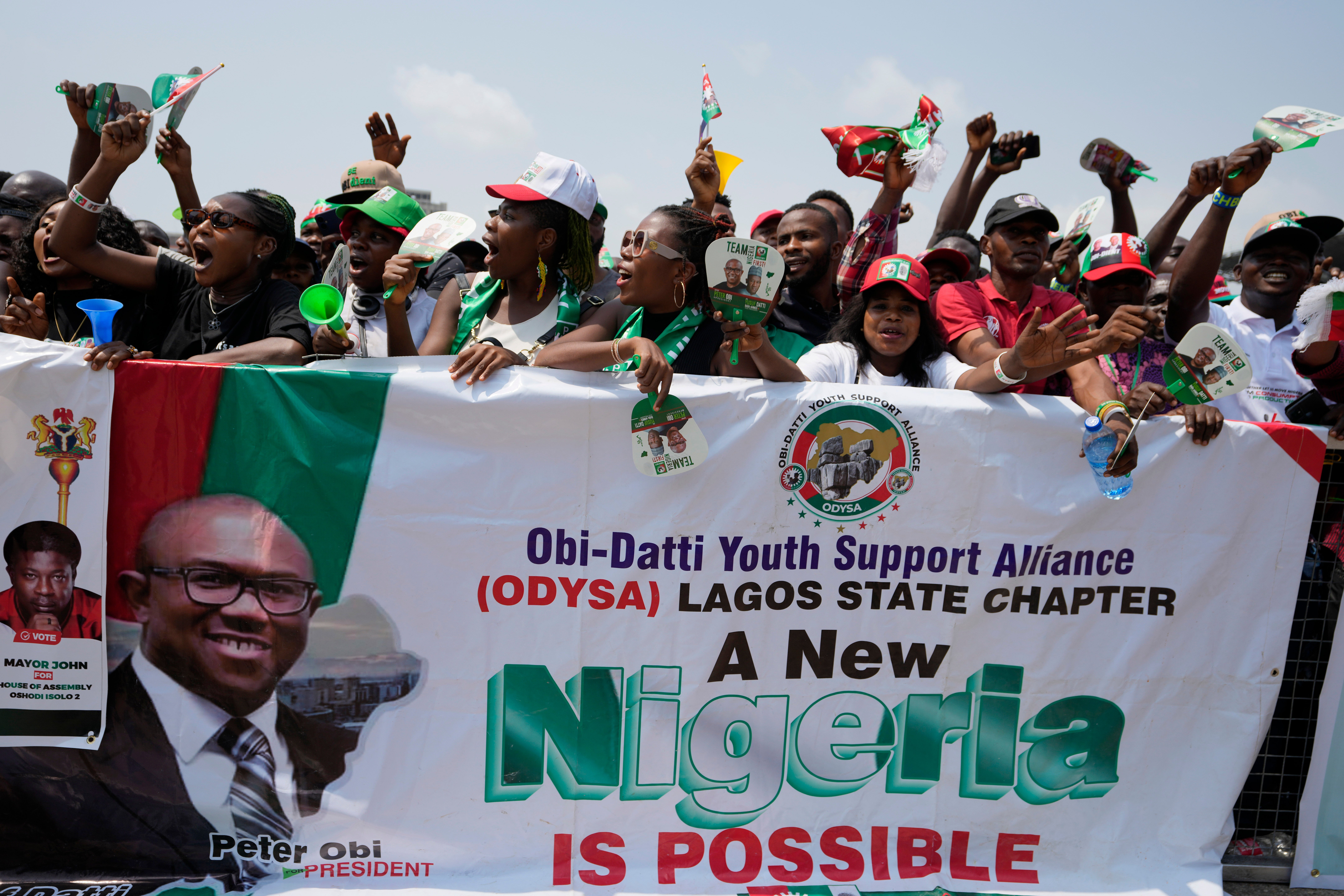Nigeria's presidential frontrunners in final push for votes
The leading contenders in Nigeria’s presidential election have made their last push for support as the campaign period nears its end

Your support helps us to tell the story
From reproductive rights to climate change to Big Tech, The Independent is on the ground when the story is developing. Whether it's investigating the financials of Elon Musk's pro-Trump PAC or producing our latest documentary, 'The A Word', which shines a light on the American women fighting for reproductive rights, we know how important it is to parse out the facts from the messaging.
At such a critical moment in US history, we need reporters on the ground. Your donation allows us to keep sending journalists to speak to both sides of the story.
The Independent is trusted by Americans across the entire political spectrum. And unlike many other quality news outlets, we choose not to lock Americans out of our reporting and analysis with paywalls. We believe quality journalism should be available to everyone, paid for by those who can afford it.
Your support makes all the difference.The leading contenders in Nigeria’s presidential election have made their last push for support, a week before the West African nation's key election.
As the campaign period neared its end, both the ruling party’s Bola Tinubu and the main opposition's Atiku Abubakar on Saturday held rallies in the northeast, where extremists have waged a decade-long insurgency against Nigeria. They both promised to improve the lives of residents in the region.
On social media, third-party candidate Peter Obi, who has emerged ahead of the other 17 candidates in most polls, said Africa’s most populous country needs a “reset and reboot" from the two major parties that have governed Nigeria since it left military rule in 1999.
The Feb. 25 election that would lead to a transitional government is the most consequential vote in many years for Nigeria, a country of more than 210 million people, according to analysts.
“This is a battle for the soul of the country considering the challenges confronting the country,” said Idayat Hassan, who leads the Center for Democracy and Development that promotes democracy in the country.
Nigeria is struggling with a worsening security crisis that has killed thousands in the past year, an ailing economy that has made citizens poorer, and growing separatist agitations in the southern region that have left the country more divided along ethnic lines.
“This is where the future of our state and the country resides — in the hands of PDP,” the main opposition Peoples Democratic Party's Abubakar told thousands of supporters in Adamawa state as they waved the party’s red, green and white colours.
“If you give us your mandate, we promise to lead by our promises to make sure that we have a united country, a peaceful country, a buoyant economy for our country; that we have the best education for our children and also we devolve powers to our states and local governments with corresponding resources,” said the 76-year-old, who has taken part in two previous presidential elections, including in 2019 when he lost to incumbent President Muhammadu Buhari.
In Borno state, the epicenter of the 12-year-long extremism that has upended lives and livelihoods for millions, causing one of the world’s worst humanitarian crises, Tinubu, of the ruling All Progressives Congress, or APC, told multitudes of supporters that “renewed hope is here; success is back. We will take care of all of you.”
The former governor of Lagos — Nigeria’s economic hub and largest city — promised to replicate what he did when he led that state from 1999 to 2007.
“We are promising you the people of Borno, you have faced difficulties and challenges (but) that is over now,” said the 71-year-old as he addressed supporters waving brooms — the party’s symbol.
“I can guarantee one thing: "We will revive the economy, we will develop Nigeria,” Tinubu said.
The Labour Party’s Obi — who has grown from an underdog in the early days of the campaign to become the favorite in most polls — is appealing in particular to Nigeria’s young, a large percentage of the country's 93.4 million registered voters.
“In this march to freedom, I have not come out for myself! I have come out for the millions of youths that are losing hope in our beloved country!” Obi tweeted.
In a backlash against the two most popular parties, the 61-year-old said Nigeria is not bereft of good governance ideas and plans but is “bedeviled by the impunity" of a small number of people benefiting from the country’s resources at the expense of the masses.